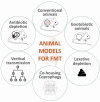Investigating causality with fecal microbiota transplantation in rodents: applications, recommendations and pitfalls
- PMID: 34328058
- PMCID: PMC8331043
- DOI: 10.1080/19490976.2021.1941711
Investigating causality with fecal microbiota transplantation in rodents: applications, recommendations and pitfalls
Abstract
In recent years, studies investigating the role of the gut microbiota in health and diseases have increased enormously - making it essential to deepen and question the research methodology employed. Fecal microbiota transplantation (FMT) in rodent studies (either from human or animal donors) allows us to better understand the causal role of the intestinal microbiota across multiple fields. However, this technique lacks standardization and requires careful experimental design in order to obtain optimal results. By comparing several studies in which rodents are the final recipients of FMT, we summarize the common practices employed. In this review, we document the limitations of this method and highlight different parameters to be considered while designing FMT Studies. Standardizing this method is challenging, as it differs according to the research topic, but avoiding common pitfalls is feasible. Several methodological questions remain unanswered to this day and we offer a discussion on issues to be explored in future studies.
Keywords: Fecal microbiota transplantation; antibiotics; experimental design; germ-free; gnotobiotic; human; methods; microbiota depletion; rodent.
Conflict of interest statement
Gerard Clarke has spoken at meetings sponsored by food (Probi) and pharmaceutical companies (Janssen Ireland) and received research funding from Pharmavite, and this support neither influenced nor constrained the contents of this manuscript and John F. Cryan received research support from Cremo, Pharmavite, Dupont and Nutricia and has spoken at meetings sponsored by food and pharmaceutical companies, and this support neither influenced nor constrained the contents of this manuscript. Cassandra E. Gheorghe, Nathaniel L. Ritz, Jason A. Martin and Hannah R. Wardill declare they have no competing interests.
Figures




Similar articles
-
Procedures for Fecal Microbiota Transplantation in Murine Microbiome Studies.Front Cell Infect Microbiol. 2021 Sep 21;11:711055. doi: 10.3389/fcimb.2021.711055. eCollection 2021. Front Cell Infect Microbiol. 2021. PMID: 34621688 Free PMC article. Review.
-
Spatial heterogeneity of bacterial colonization across different gut segments following inter-species microbiota transplantation.Microbiome. 2020 Nov 18;8(1):161. doi: 10.1186/s40168-020-00917-7. Microbiome. 2020. PMID: 33208178 Free PMC article.
-
Establishing or Exaggerating Causality for the Gut Microbiome: Lessons from Human Microbiota-Associated Rodents.Cell. 2020 Jan 23;180(2):221-232. doi: 10.1016/j.cell.2019.12.025. Cell. 2020. PMID: 31978342
-
[Application of metagenomic and culturomic technologies in fecal microbiota transplantation: a review].Sheng Wu Gong Cheng Xue Bao. 2022 Oct 25;38(10):3594-3605. doi: 10.13345/j.cjb.220573. Sheng Wu Gong Cheng Xue Bao. 2022. PMID: 36305395 Review. Chinese.
-
[Chinese experts consensus on standardized methodology and clinical application of fecal microbiota transplantation].Zhonghua Wei Chang Wai Ke Za Zhi. 2020 Jul 10;23(Z1):5-13. doi: 10.3760/cma.j.cn.441530-20200420-00231. Zhonghua Wei Chang Wai Ke Za Zhi. 2020. PMID: 32594719 Chinese.
Cited by
-
Gut phages and their interactions with bacterial and mammalian hosts.J Bacteriol. 2025 Feb 20;207(2):e0042824. doi: 10.1128/jb.00428-24. Epub 2025 Jan 23. J Bacteriol. 2025. PMID: 39846747 Free PMC article. Review.
-
Quantitative Synthesis of Microbe-Driven Acclimation and Adaptation in Wild Vertebrates.Evol Appl. 2024 Oct 9;17(10):e70025. doi: 10.1111/eva.70025. eCollection 2024 Oct. Evol Appl. 2024. PMID: 39391863 Free PMC article. Review.
-
Opioid trail: Tracking contributions to opioid use disorder from host genetics to the gut microbiome.Neurosci Biobehav Rev. 2024 Jan;156:105487. doi: 10.1016/j.neubiorev.2023.105487. Epub 2023 Nov 30. Neurosci Biobehav Rev. 2024. PMID: 38040073 Free PMC article. Review.
-
Gut microbiota links to cognitive impairment in bipolar disorder via modulating synaptic plasticity.BMC Med. 2025 Aug 12;23(1):470. doi: 10.1186/s12916-025-04313-6. BMC Med. 2025. PMID: 40797316 Free PMC article.
-
Gut microbiota and serum metabolomic alterations in modulating the impact of fecal microbiota transplantation on ciprofloxacin-induced seizure susceptibility.Front Microbiol. 2024 Jun 19;15:1403892. doi: 10.3389/fmicb.2024.1403892. eCollection 2024. Front Microbiol. 2024. PMID: 38962126 Free PMC article.
References
-
- Cryan JF, O'Riordan K, Cowan CSM, Sandhu KV, Bastiaanssen TFS, Boehme M, Codagnone MG, Cussotto S, Fulling C, Golubeva AV, et al. The microbiota-gut-brain axis. Physiol Rev. 2019;99:1877–51. - PubMed
-
- Sun M-F, Zhu YL, Zhou ZL, Jia XB, Xu YD, Yang Q, Cui C, Shen YQ. Neuroprotective effects of fecal microbiota transplantation on MPTP-induced Parkinson’s disease mice: gut microbiota, glial reaction and TLR4/TNF-α signaling pathway. Brain Behav Immun. 2018;70:48–60. doi:10.1016/j.bbi.2018.02.005. - DOI - PubMed
Publication types
MeSH terms
LinkOut - more resources
Full Text Sources
Medical
